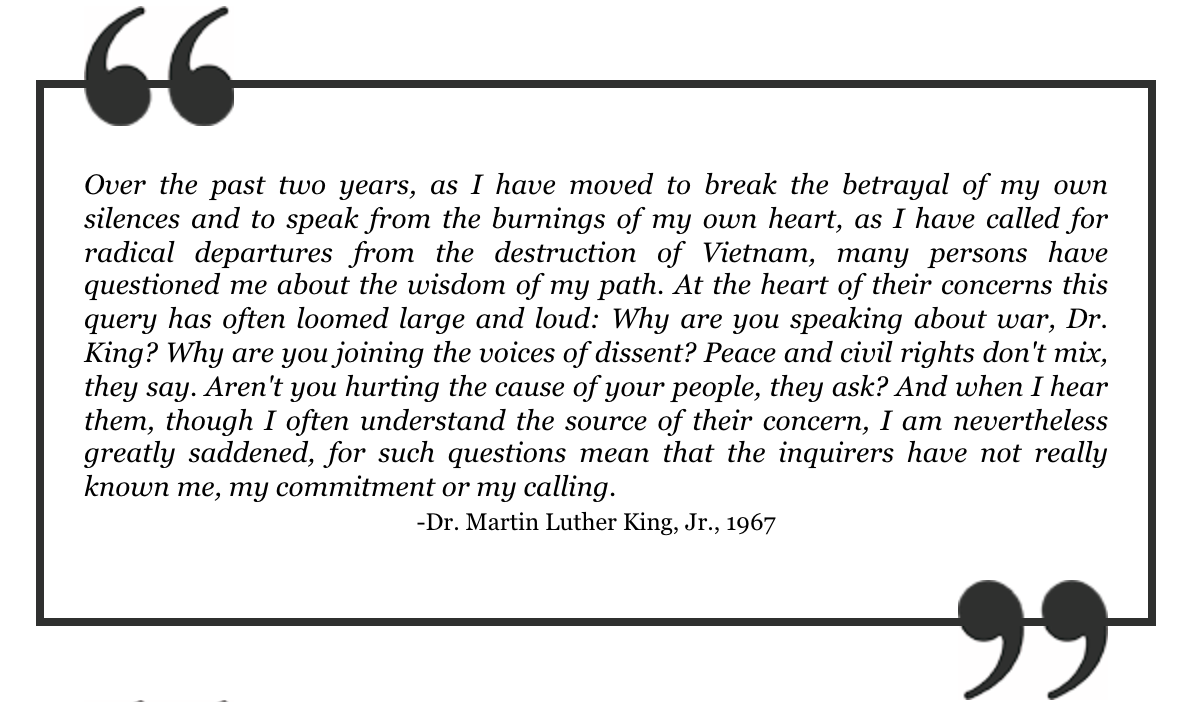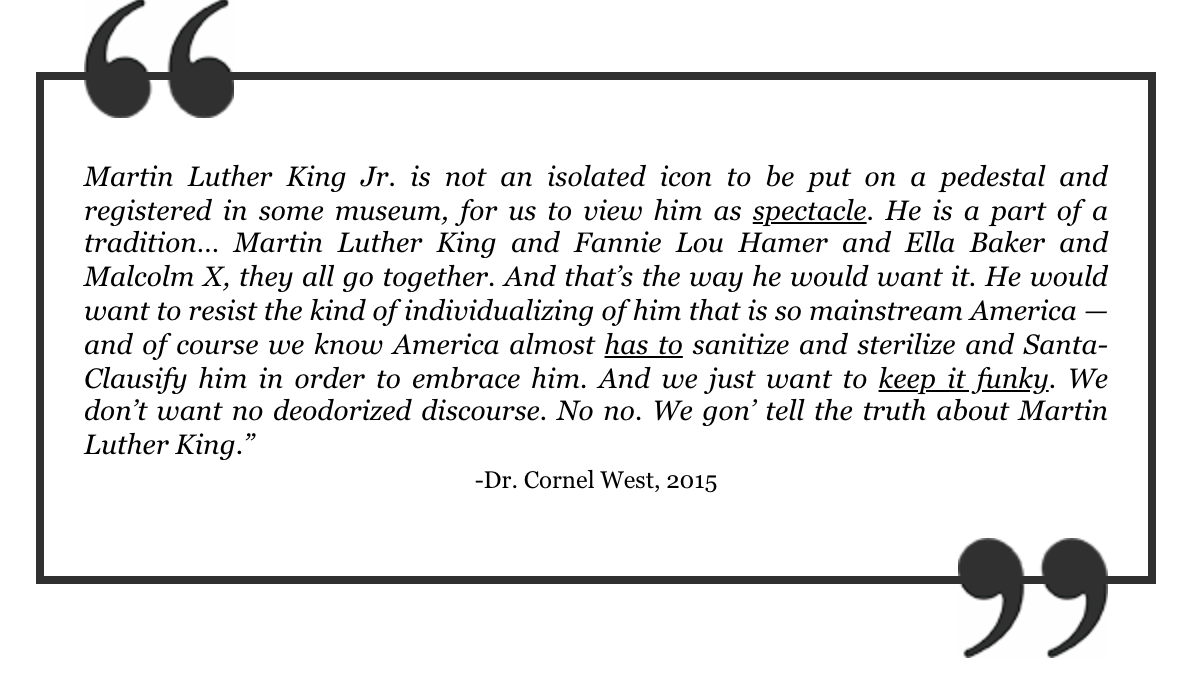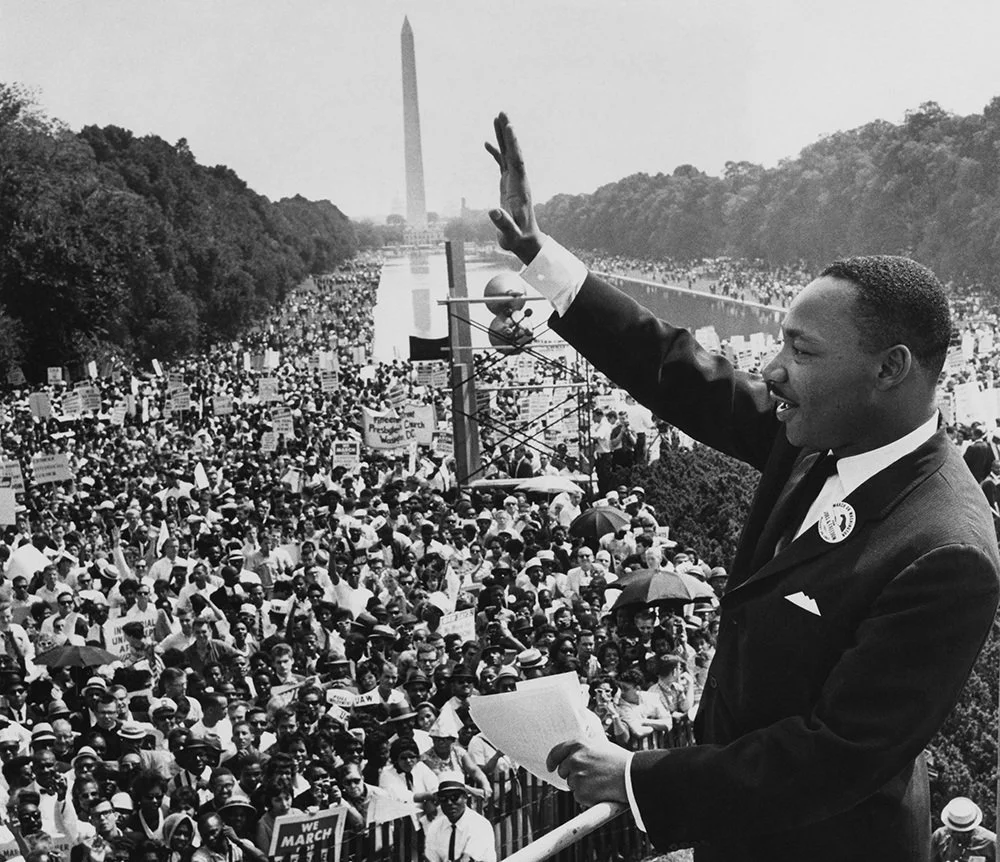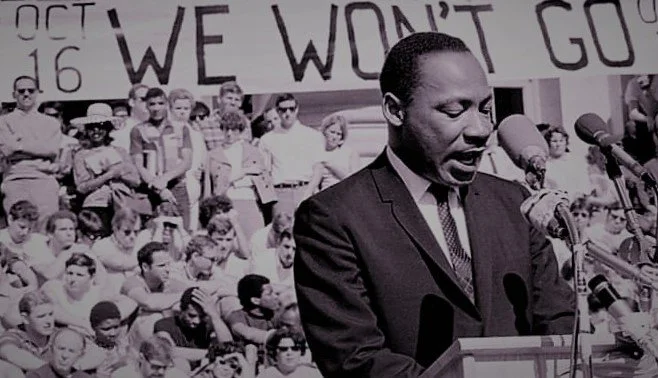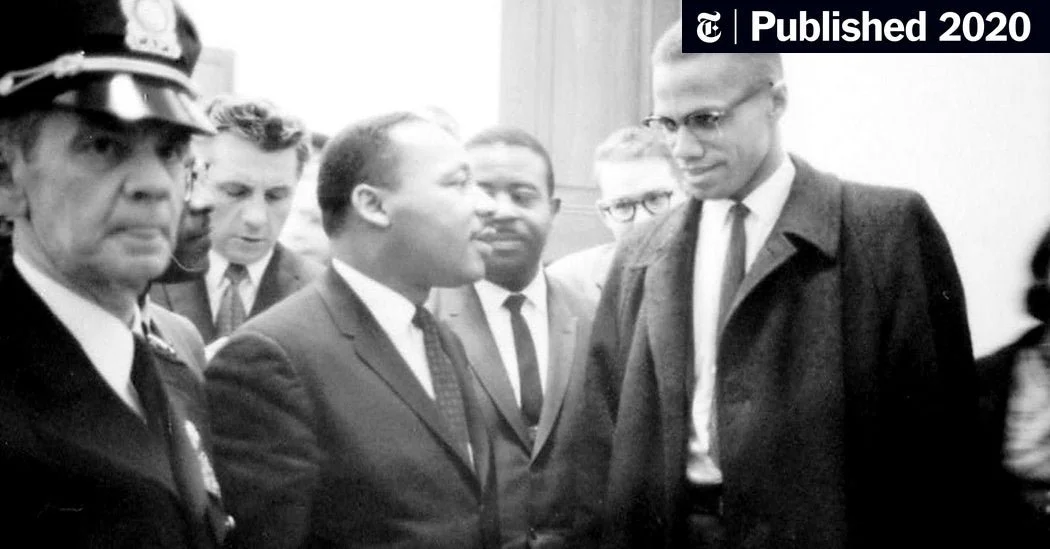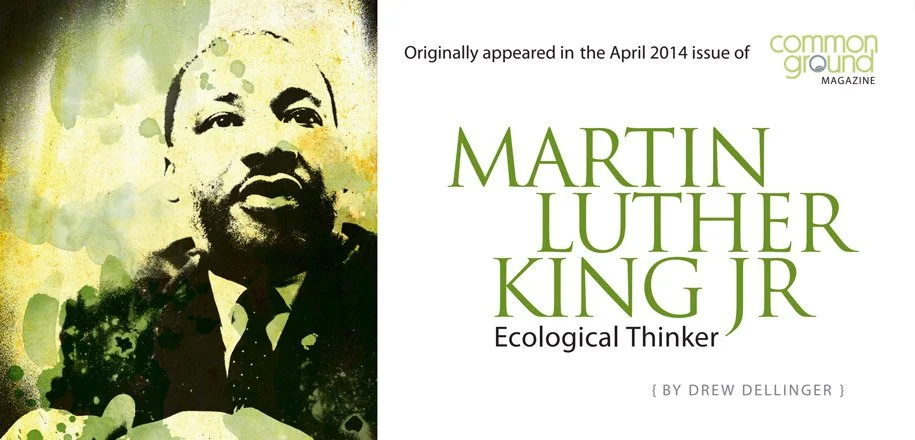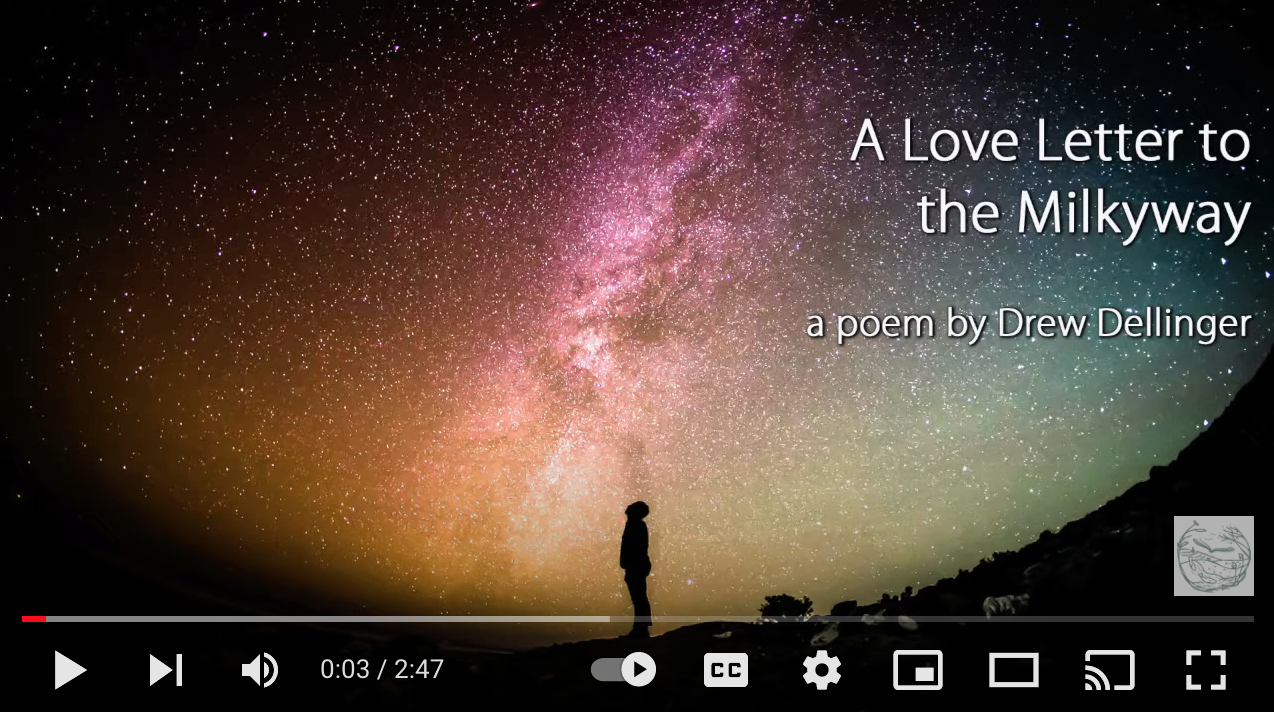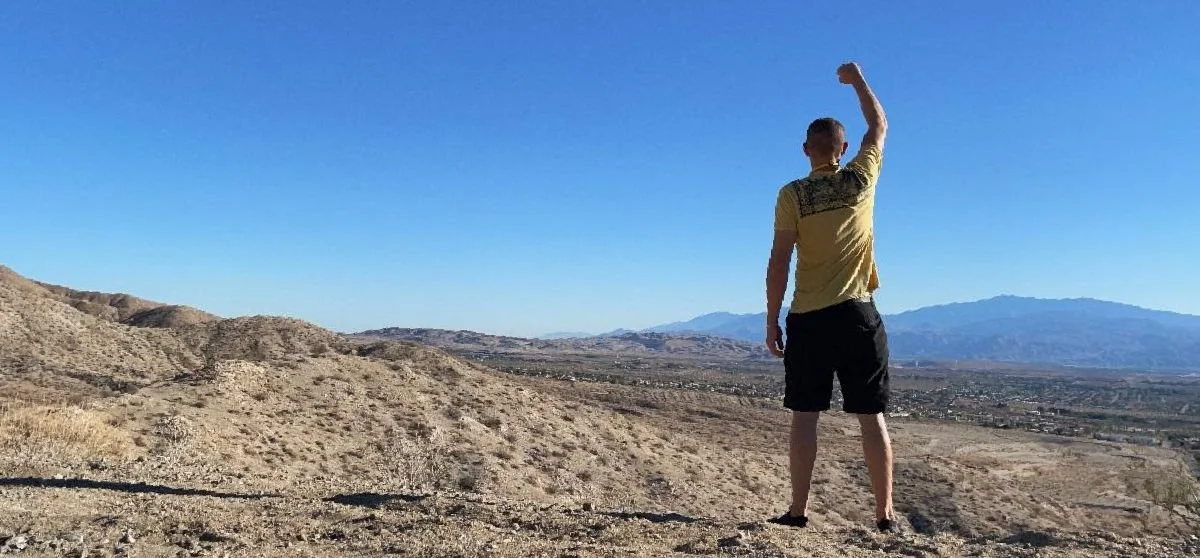Honoring the Radical, Relevant and Revolutionary Legacy of a Sanitized Cultural Icon Who Stood for More than Civil Rights
Good tidings of peace and justice, friends!
Having just marked my one-year “canciversary,” I look forward to sharing more in an upcoming post on my now-yearlong dance with cancer, as well as my recent snowboarding adventure with fellow young adult survivors organized by the Send It Foundation. Today, however, it is my bliss to discuss a topic that is quite dear to me: the true legacy of a great warrior for social, environmental and economic justice —Dr. Martin Luther King Jr.
Even to say “Happy Martin Luther King Day” is to engage on some level in the sanitization and white-washing of a true revolutionary — and that is very much the topic of this week’s dispatch. May it serve our shared liberation.
Dr. King has been a powerful teacher on my path. To me, he represents not only the consciousness that, as he so often put it, “all life is interrelated,” but also an absolute commitment to living and embodying the ideals of justice and an abiding understanding that “the means we use must be as pure as the ends we seek.” I have his photo on my wall above my desk and I listen to audio of his recordings regularly.
If you’re in the mood for some inspiration, I especially recommend those recorded in the final years of his life, well after the iconic “I Have a Dream” speech we all studied in high school. My favorites include “The Crisis in Civil Rights” (December 7, 1964), “Beyond Vietnam: A Time to Break Silence” (April 4, 1967), “A Christmas Sermon on Peace” (December 24, 1967), and, above all, his final speech “I’ve Been to the Mountaintop” (April 3, 1968).
During my graduate studies at CIIS, I was blessed to participate in a course on “Martin Luther King: Cosmology & Consciousness” with Dr. Drew Dellinger, a powerful King scholar, visionary poet, and author of Love Letter to the Milky Way. Drew has remained a mentor and role model in my life, and further on in this post, I honor him with a humble “Gold Star” for his sacred work and the impact he has had on my journey. You can learn more about Dr. Dellinger on his website, drewdellinger.org.
But first, allow me to offer up a piece of writing I first penned during that most intensive year of my King studies, entitled, “Resurrecting the Radical King and Keeping it Funky: De-Sanitizing the Still-Relevant Legacy of Dr. Martin Luther King Jr.” You can find my works cited at the end of this post, and you can read additional writings on my website, nilspalsson.org.
Please enjoy the article below, and please continue to share and uplift the revolutionary, anti-imperialist, anti-capitalist message that was at the true heart of King’s teachings. He stood for more than civil rights. He stood for peace — with a persistent reminder that “true peace is not merely the absence of tension: it is the presence of justice.”
One Love,
Nils
Resurrecting the Radical King and Keeping it Funky: De-Sanitizing the Still-Relevant Legacy of Dr. Martin Luther King Jr.
In the decades since his martyrdom in 1968, the Reverend Dr. Martin Luther King Jr. has become a cultural icon in America and abroad, recognized by adults and schoolchildren the world over. A 2014 study on global fame by the Media Lab at the Massachusetts Institute of Technology placed King at the top of its list of well-known Americans worldwide, ahead of pop icons Elvis Presley and Marilyn Monroe. Such widespread recognition of this great leader, however, often brings with it a misremembering of his truth and his radical legacy, what historian Michael Eric Dyson refers to as “the determined misuse of King's rhetoric… bizarre and sophisticated distortions of King's true meaning.” Far from being limited to the “civil rights” struggle of Black people in America, this true meaning and legacy of Dr. King included an acute awareness of the cosmological view that “all life is interrelated,” and a commitment to holistically engaging the overlapping issues of poverty and economic injustice, war and imperialism, systemic racism, and environmental degradation — issues which very much continue to plague our world in the twenty-first century. Particularly after the movement’s Civil Rights and Voting Rights Amendment victories in 1964 and 1965 — following King’s legendary 1963 “I Have a Dream” speech where he remains, in many ways, frozen in time — Dr. King gradually expanded the scope of his vision and rhetoric to include awareness of the Vietnam War and imperialism, ecological issues, and the systemic failure of capitalism. Only by remembering the nuanced and radical — the funky — truth of this leader, will modern humans truly resurrect and honor the spirit of King.
Just ten days before King was murdered, Rabbi Abraham Joshua Heschel said that “the whole future of America will depend on the impact and influence of Dr. King.” So far, much of the remembrance of King has included a widely distorted view of that impact and influence — one which often omits the evolution of King’s message in the three years of his life following the 1963 March on Washington. A 1999 survey of rhetoric scholars placed King’s “Dream” speech at the top of their list of the 100 best political speeches of the 20th Century — and, indeed, the address represents a triumph of the people’s movement in many ways — but it was truly well after this landmark address that the radical King began to inveigh most intently against the ravages of wider issues like poverty, war and ecological destruction. Many King scholars have written extensively on the transformation of the reverend’s message and rhetoric in the last few years of his life, those immediately following the momentous “Dream” speech and the victories of the Civil Rights Act and Voting Rights Acts. Richard Lischer has referred to this period as King’s transition “From Identification to Rage.” Drew Dellinger has termed these final years his “Mountaintop Period.” Whatever we choose to call these last years of King’s corporeal existence, there is overwhelming evidence that his focus in this era widened in scope beyond the civil rights struggles of Black Americans, to include these more global and even universal approaches to improving our world through economic democracy, environmental justice, and an end to militarism and imperialism.
King’s oft-overlooked stance against war, imperialism and nuclear proliferation is one of the glaringly obvious places to start in examining the ways in which his image has been sanitized and his true message diluted. In the late 1960s, as the Civil Rights Movement (in which King’s participation has long been axiomatic) steamed forward, the Vietnam War was simultaneously scaling up and gaining more public attention. It was particularly after King’s trip to Jamaica in 1967, seeing images in Ramparts magazine of the death and destruction wrought by American bombs, that King committed most deeply to participate in ending the Vietnam War. Once stateside again, King’s antiwar ministry began in earnest. In an April, 1967 speech entitled, “Beyond Vietnam: A Time to Break Silence,” King outlines his conviction. “I knew I could never again raise my voice against the violence of the oppressed in the ghettos without having first spoken clearly to the greatest purveyor of violence in the world today: my own government,” he spoke, in his address to clergy and laity at the Riverside Church in New York City. “For the sake of those boys, for the sake of this government, for the sake of hundreds of thousands trembling under our violence, I cannot be silent.” These concerns would be echoed in further writings and speeches by King in the coming months (the last of his life), including another April 1967 sermon at his own Ebenezer Baptist Church in Atlanta, noting the hypocrisy of crusading for civil rights at home while perpetrating atrocities abroad: ‘‘There is something strangely inconsistent about a nation and press that will praise you when you say be nonviolent toward Jim Clark, but will curse you and damn you when you say be nonviolent toward little brown Vietnamese children.’’ These statements, along with King’s membership in groups such as “National Committee Toward a Sane Nuclear Policy” and “Turn Toward Peace Today” speak volumes of his true identity as much more than the victorious “civil rights leader” we know.
America’s focus over the last decades on a superficial and moderate version of King has, perhaps unsurprisingly, also consistently overlooked the emphasis he placed — especially in his later years — on economic democracy and an effort to end poverty for people of all colors. In 1965, King published an article for Pageant magazine entitled, “The Bravest Man I Ever Met,” celebrating the Presbyterian minister and six-time socialist presidential candidate Norman Thomas — and suggesting Thomas be appointed America’s ambassador to the United Nations. Here, he quotes the white socialist leader at length, giving some insight into the aspects of Thomas’s character which King found to be so compellingly brave: “The hope for the future lies in a new social and economic order which demands the abolition of the capitalist system. War itself is only the most horrible and dramatic of the many evil fruits of our present organized system of exploitation and the philosophy of life which exalts competition instead of cooperation.” King would echo in his own words this call to transform our domestic and global economic system — but, situated within America’s McCarthy-era anticommunist hysteria, he was aware of the political risk involved in openly association with the cause of socialism. King privately identified as a democratic socialist for much of his adult life. According to an anecdote related by Cornel West in a 2015 speech, Coretta Scott King told him the first time they met, “You know, when Brother Martin Luther King Jr. first took me out on a date, he said to me, ‘I’ll be you never met a Black socialist before.’ That’s 1952.”
As King moved into his ‘Mountaintop Period,” however, he began to share more publicly his critiques of capitalism. After his trip to Norway and Sweden to receive the Nobel Peace Prize in 1967 — where he saw no slums and a generally higher quality of life for all citizens — King delivered a speech entitled “The Crisis in Civil Rights,” in which he explicitly raised his concerns. “Now I had to raise the question,” he said, “that maybe something is wrong with our economic system the way it’s presently going.” A year earlier, at a retreat for members of his Southern Christian Leadership Conference in Frogmore, SC — in what Dellinger refers to as “one of the more unguarded speeches of the Mountaintop Period” — the extent of King’s ‘question’ over our economic system is laid out more explicitly still. He began clearly outlining the intimate ties that exist between capitalism and racial injustice, noting that “you can’t talk about solving the economic problem of the Negro without talking about billions of dollars. You can’t talk about ending slums without first saying profit must be taken out of slums.” King here was beginning to make more clear than ever, in his ‘cosmology of connection,’ that “the problem of racism, the problem of economic exploitation, and the problem of war are all tied together. These are the triple evils that are interrelated.”
Of course, even as he spoke these words, he was deeply aware of the transgressive nature of some of his critiques of the economic paradigm of competition and exploitation. He spoke these ‘unguarded’ words against capitalism among close colleagues and intimates, in the safe confines of a retreat setting, the kind “where you can discuss such things, and you are not accused of being a Communist for discussing it.” He acknowledged later, in the same speech, that he was aware speaking in such a way constituted “getting on dangerous ground…because it really means that we are saying that something is wrong with the economic system of our nation. That is what it means really. It means that something is wrong with capitalism.” These candidly expressed views on the root causes global suffering may shed additional light on why King so admired the public and unabashed socialism of a man like Norman Thomas. It is also very telling that, in the days immediately preceding King’s suspicious assassination in Memphis, he was starting to organize working people of all colors, all around the country, for an epic-scale Poor People's March on Washington. “We want waves and waves,” King had said of his intentions in the nation’s capitol. “Waves of people coming in, bringing their grievances to Washington, saying we demand change.” He would not make it back to Washington alive.
Along with King’s powerful proclamations against militarism and capitalism during his transition ‘from identification to rage,’ we see him begin to recognize and speak on the interconnection between many other seemingly separate struggles. In a glimmer of his emergence as an ecological thinker, King once remarked, “One cannot be concerned with civil rights alone. I’s very nice to drink milk at an integrated lunch counter, but not if its poisoned with strontium-90.” He was simultaneously aligning himself with Cesar Chavez and the plight of American migrant farmworkers. During Chavez’s 1968 hunger strike, King sent the Chicano leader a telegram saying, “Our separate struggles are really one. A struggle for freedom, for dignity, and for humanity.”
This perspective of the multi-dimensional and radical Martin Luther King helps to illustrate why Dyson has proposed “a ten-year moratorium” on listening to or reading the legendary ‘I Have a Dream’ speech. “The sad truth is… that our political climate has eroded the real point of King's beautiful words,” he writes. Cornel West further reminds us that “Martin Luther King didn’t live and die to have a holiday — especially authorized by the very government that had him under surveillance for 13 years.” A living embodiment of the radical spirit of Dr. King and his “black prophetic fire,” Dr. West continues to demonstrate the ways in which the true message of “the radical King” resonates today. Leading a group of Occupy D.C. members to be arrested for civil disobedience on the steps of the United States Supreme Court building in 2011, West’s voice resounded, "We will not let this day of Martin Luther King’s memorial go by without somebody being arrested — because Martin King would be right here with us, willing to throw down out of deep love!”
Gold Stars: Drew Dellinger
Drew Dellinger, Ph.D., is an internationally known speaker, poet, writer, and teacher whose keynotes and poetry performances — which address ecology, justice, cosmology, and connectedness — have inspired minds and hearts around the world. He is also a consultant, filmmaker, and founder of Planetize the Movement.
Drew has been called “a national treasure” by Joanna Macy, “a deep and courageous poet” by Alice Walker, and “one of the most creative, courageous and prophetic voices of his generation” by Cornel West. And I must concur with these assessments.
Drew is also a noted King scholar, and he played a huge role in my ongoing awakening process and my initial exploration of the deeper meaning of MLK's message while I was a student at the California Institute of Integral Studies in San Francisco between 2015 and 2017, and in subsequent years as a friend and mentor. You can read an excellent article he wrote about King for Common Ground Magazine entitled "Martin Luther King Jr: Ecological Thinker" here.
One of Dr. Dellinger's better-known pieces of poetry is a spoken word piece entitled "A Love Letter to the Milky Way," which you can hear him read in this short video. It was also published in print along with several other poems of his in a book with the same title, available here.
You can learn more about Drew, access more writings and videos, and get involved with his ongoing, powerful work on his website, drewdellinger.org
Works Cited
King, Dr. Martin Luther. “Beyond Vietnam: A Time to Break the Silence.” Information Clearinghouse. Web. 2 Apr 2015. http://www.informationclearinghouse.info/article2564.htm
West, Cornel. "Cornel West: A Tribute to Dr. Martin Luther King, Jr." YouTube. INFORUM at the Commonwealth Club, 15 Jan. 2015. Web. 03 Apr. 2015. <https://www.youtube.com/watch?v=jzry6lmZ930>.
Hidalgo, Cesar A. "Pantheon: Mapping Historical Cultural Production." Pantheon. MIT Media Lab, 1 Jan. 2014. Web. 03 Apr. 2015. <http://pantheon.media.mit.edu/treemap/country_exports/US/all/-4000/2010/H15/OGC>.
Dyson, Michael E. "I May Not Get There With You: The True Martin Luther King, Jr." New York Times. New York. 10 May. 2000. Web. 3 Apr. 2015. <https://www.nytimes.com/books/first/d/dyson-may.html>.
King, Dr. Martin Luther, Jr. "A Christmas Sermon on Peace.” Christmas Eve Service. Ebenezer Baptist Church, Atlanta, GA. 24 Dec. 1967. Speech.
Waskow, Rabbi Arthur. "The Shalom Center." April 4 & MLK: Prophetic Voice, Prophetic Death. The Shalom Center, 3 Apr. 2013. Web. 03 Apr. 2015.
<https://theshalomcenter.org/content/april-4-mlk-prophetic-voice-prophetic-death>.
Sundquist, Eric J. King’s Dream: The Legacy of Martin Luther King’s “A Have a Dream” Speech. Yale University Press. New Haven. 2009.
Lischer, Richard. The Preacher King: Martin Luther King Jr. and the Word that Moved America. Oxford University Press. London. 1997.
Dellinger, Drew.The Mountaintop Vision: King’s Cosmology of Interconnection. California Institute of Integral Studies. San Francisco. 2013.
King, Dr. Martin Luther, Jr. ’’Why I Am Opposed to the War in Vietnam.’’ 30 April 1967. Martin Luther King Electronic Collection. Web. 3 April 2015. <http://mlkkpp01.stanford.edu/kingweb/about_king/encyclopedia/carmichael_stokely.html.>
West, Dr. Cornel. The Radical King. Beacon Press. Boston. 2015. p. 230.
King, Dr. Martin Luther, Jr. “The Bravest Man I Ever Met.” Pageant magazine. Hillman Periodicals. New York. June 1965. Web. 2 April 2015.
< http://warisacrime.org/content/bravest-man-i-ever-met-dr-martin-luther-king-jr-1965>.
Chavez, Cesar. “Lessons of Dr. Martin Luther King Jr.” 12 Jan 1990. Web. 1 April 2015. <http://clnet.ucla.edu/research/chavez/themes/ccmlk.htm>
Walker, Brittney M. "Raheem DeVaughn Arrested at Occupy D.C. with Cornel West." EURweb. N.p., 18 Oct. 2011. Web. 03 Apr. 2015.
<http://www.eurweb.com/2011/10/raheem-devaughn-arrested-at-occupy-d-c-with-cornel-west/>.


